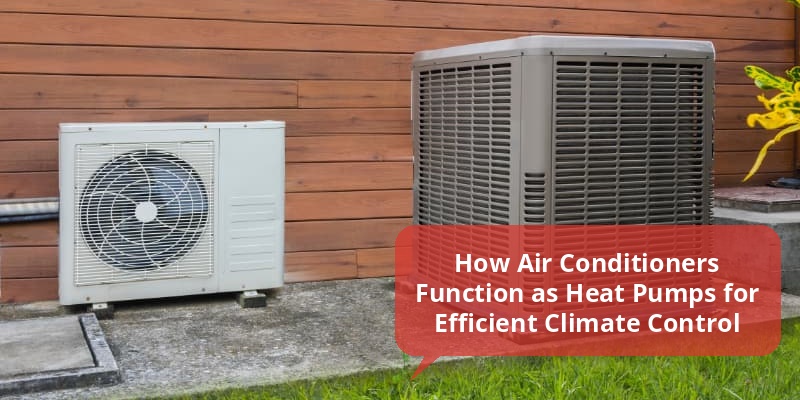Air conditioners and heat pumps share a fundamental technology that allows them to both cool and heat indoor spaces by transferring heat, making air conditioners essentially a type of heat pump. This dual functionality enables efficient climate control year-round. Understanding how air conditioners operate as heat pumps helps consumers appreciate their energy-saving benefits and versatility in managing indoor temperatures.
| Term | Definition | Function in System |
|---|---|---|
| Heat Pump | Device that transfers heat from one area to another, providing both heating and cooling. | Moves heat indoors or outdoors depending on the mode. |
| Air Conditioner | Appliance designed to cool indoor air by removing heat. | Functions as a heat pump by extracting heat from inside and releasing it outside. |
| Refrigerant | Fluid used to absorb and release heat in the system. | Circulates through compressor and coils to transfer heat efficiently. |
| Compressor | Mechanical pump that cycles refrigerant through the system. | Increases refrigerant pressure and temperature during heat transfer. |
Understanding the Heat Transfer Process in Air Conditioners
An air conditioner uses refrigerant to absorb heat from indoor air and release it outdoors, functioning on the principles of a heat pump. The refrigerant circulates through the evaporator coil inside the home, where it absorbs heat and evaporates into a gas. This heat-laden gas is then compressed by the compressor, which raises its temperature and pressure. The hot gas flows to the condenser coil outside, where it releases heat to the outside air and condenses back into a liquid. This cycle continuously removes heat from the indoor environment, cooling the space efficiently.
This reversible cycle is the hallmark of heat pumps, allowing the system to heat or cool depending on the direction of refrigerant flow.
Heat Pump Mode: Heating With an Air Conditioner
Air conditioners equipped with a reversing valve can operate as heat pumps by reversing the refrigerant flow. In heating mode, the system absorbs heat from the outside air—even in cold conditions—and transfers it indoors. The evaporator coil outside extracts heat from the ambient air, and the compressor increases the refrigerant’s temperature before the heat is released indoors via the indoor coil acting as a condenser.
This process makes heat pumps an energy-efficient alternative to traditional furnace heating since they move heat rather than generate it through combustion.
Benefits of Using Air Conditioners as Heat Pumps
- Energy Efficiency: Heat pumps use less energy than conventional heating systems by moving heat instead of producing it.
- Year-Round Comfort: One system provides both heating and cooling, reducing equipment needs.
- Lower Emissions: Heat pumps reduce dependence on fossil fuels, cutting greenhouse gas emissions.
- Cost Savings: Reduced energy use leads to lower utility bills for consumers.
- Environmentally Friendly Refrigerants: Modern systems use low global warming potential refrigerants enhancing sustainability.
Comparing Air Conditioners and Traditional Heating Systems
| Feature | Air Conditioner as Heat Pump | Traditional Furnace |
|---|---|---|
| Energy Source | Electricity | Natural Gas, Oil, or Electricity |
| Energy Efficiency | High (300%+ efficiency in ideal conditions) | Moderate (80-95% efficiency) |
| Heating Method | Heat Transfer from Outside Air | Combustion or Electric Resistance |
| Carbon Emissions | Low, depending on electricity source | Higher due to fuel combustion |
| Cooling Capability | Integrated | Separate system required |
Limitations and Considerations of Heat Pump Operation
Although heat pumps offer many advantages, their heating performance can decline in extremely low temperatures. In regions with severe winters, supplemental heating may be necessary. Advances in cold climate heat pumps, however, have improved their ability to efficiently extract heat at lower temperatures.
System sizing and proper installation are critical to maximize effectiveness and minimize operating costs throughout the year.
Maintaining Air Conditioners and Heat Pumps for Peak Performance
Routine maintenance is essential to ensure air conditioners operating as heat pumps maintain their efficiency and longevity. Key maintenance tasks include replacing or cleaning filters regularly, inspecting coils, checking refrigerant levels, and servicing the compressor and fans.
Proper maintenance also prevents system breakdowns and helps sustain optimal indoor air quality.
Advances in Heat Pump Technology Enhancing Air Conditioners
Innovations such as variable-speed compressors, smart thermostats, and eco-friendly refrigerants are making heat pump-based air conditioners more efficient and user-friendly. These developments allow precise temperature control, reduced energy consumption, and integration with home automation systems.
Such technological enhancements improve comfort while lowering environmental impact and operational costs.
Choosing the Right Air Conditioner or Heat Pump for Your Home
When selecting an air conditioner or heat pump system, consider factors such as climate, home insulation, size of living space, and energy costs. Consulting HVAC professionals for load calculations and system recommendations ensures the chosen system meets your heating and cooling needs efficiently.
Investment in a properly sized and modern heat pump system delivers the best balance of comfort and savings.
